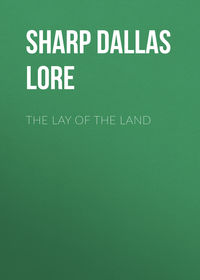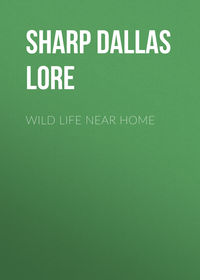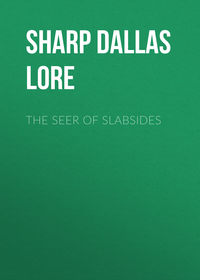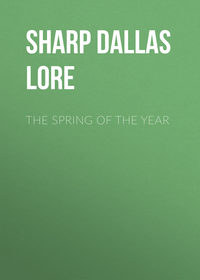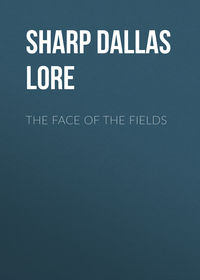 полная версия
полная версияA Watcher in The Woods
A hammock for a winter bed? Is there anything snug and warm about a hammock? Not much, true enough. From the outside the gray squirrel's leaf bed looks like the coldest, deadliest place one could find in which to pass the winter. The leaves are loose and rattle in the wind like the clapboards of a tumble-down house. The limb threatens every moment to toss the clumsy nest out upon the storm. But the moorings hold, and if we could curl up with the sleeper in that swaying bed, we should rock and dream, and never feel a shiver through the homespun blankets of chestnut bark that wrap us round inside the flapping leaves.
Be it never so cozy, a nest like this is far from a burrow – the bed of a fat, thick-headed dolt who sleeps away the winter. A glance into the stark, frozen top of the oak sends over us a chill of fright and admiration for the dweller up there. He cannot be an ease-lover; neither can he know the meaning of fear. We should as soon think of a sailor's being afraid of the shrieking in the rigging overhead, as of this bold squirrel in the tree-tops dreading any danger that the winter winds might bring.
There are winters when the gray squirrel stays in the hollow of some old tree. A secure and sensible harbor, this, in which to weather the heavy storms, and I wonder that a nest is ever anchored outside in the tree-tops. The woodsmen and other wiseacres say that the squirrels never build the tree-top nests except in anticipation of a mild winter. But weather wisdom, when the gray squirrel is the source, is as little wise as that which comes from Washington or the almanac. I have found the nests in the tree-tops in the coldest, fiercest winters.
It is not in anticipation of fine weather, but a wild delight in the free, wild winter, that leads the gray squirrel to swing his hammock from the highest limb of the tallest oak that will hold it. He dares and defies the winds, and claims their freedom for his own. From his leafless height yonder he looks down into the Hollow upon the tops of the swamp trees where his dizzy roads run along the angled branches, and over the swamp to the dark pines, and over the pines, on, on across the miles of white fields which sweep away and away till they freeze with the frozen sky behind the snow-clouds that drift and pile. In his aery he knows the snarl and bite of the blizzard; he feels the swell of the heaving waves that drive thick with snow out of the cold white north. Anchored far out in the tossing arms of the strong oak, his leaf nest rocks in the storm like a yawl in a heaving sea.
But he loves the tumult and the terror. A night never fell upon the woods that awed him; cold never crept into the trees that could chill his blood; and the hoarse, mad winds that swirl and hiss about his pitching bed never shook a nerve in his round, beautiful body. How he must sleep! And what a constitution he has!
"MUS'RATTIN'"
One November afternoon I found Uncle Jethro back of the woodshed, drawing a chalk-mark along the barrel of his old musket, from the hammer to the sight.
"What are you doing that for, Uncle Jeth?" I asked.
"What fo'? Fo' mus'rats, boy."
"Muskrats! Do you think they'll walk up and toe that mark, while you knock 'em over with a stick?"
"G'way fum yhere! What I take yo' possumin' des dozen winters fo', en yo' dunno how to sight a gun in de moon yit? I's gwine mus'rattin' by de moon to-night, en I won't take yo' nohow."
Of course he took me. We went out about nine o'clock, and entering the zigzag lane behind the barn, followed the cow-paths down to the pasture, then cut across the fields to Lupton's Pond, the little wood-walled lake which falls over a dam into the wide meadows along Cohansey Creek.
It is a wild, secluded spot, so removed that a pair of black ducks built their nest for several springs in the deep moss about the upper shore.
It is shallow and deeply crusted over with lily-pads and pickerel-weed, except for a small area about the dam, where the water is deep and clear. There are many stumps in the upper end; and here, in the shallows, built upon the hummocks or anchored to the submerged roots, are the muskrats' houses.
The big moon was rising over the meadows as we tucked ourselves snugly out of sight in a clump of small cedars on the bank, within easy range of the dam and commanding a view of the whole pond. The domed houses of the muskrats – the village numbered six homes – showed plainly as the moon came up; and when the full flood of light fell on the still surface of the pond, we could see the "roads" of the muskrats, like narrow channels, leading down through the pads to the open space about the dam.
A muskrat's domestic life is erratic. Sometimes there will be a large village in the pond, and, again, an autumn will pass without a single new house being built. It may be that some of the old houses will be fitted up anew and occupied; but I have known years when there was not a house in the pond. At no time do all of the muskrats build winter houses. The walls of the meadow ditches just under the dam are honeycombed with subterranean passages, in which many of the muskrats live the year round. Neither food nor weather, so far as I have found, influence them at all in the choice of their winter quarters. In low, wet meadows where there are no ditches, the muskrats, of course, live altogether in mud and reed houses above ground, for the water would flood the ordinary burrow. These structures are placed on the tussocks along a water-hole, so that the dwellers can dive out and escape under water when danger approaches. But here in the tide-meadows, where the ditches are deep, the muskrats rear their families almost wholly in underground rooms. It is only when winter comes, and family ties dissolve, that a few of the more sociable or more adventurous club together, come up to the pond, and while away the cold weather in these haystack lodges.
These houses are very simple, but entirely adequate. If you will lift the top off an ordinary meadow lodge you will find a single room, with a bed in the middle, and at least one entrance and one exit which are always closed to outsiders by water.
The meadow lodge is built thus: The muskrat first chooses a large tussock of sedge that stands well out of the water for his bedstead. Now, from a foundation below the water, thick walls of mud and grass are erected inclosing the tussock; a thatch of excessive thickness is piled on; the channels leading away from the doors are dug out if necessary; a bunch of soaking grass is brought in and made into a bed on the tussock – and the muskrat takes possession.
The pond lodges at the head of Lupton's are made after this fashion, only they are much larger, and instead of being raised about, a tussock of sedge, they are built upon, and inclose, a part of a log or stump.
This lodge life is surely a cozy, jolly way of passing the winter. The possums are inclined to club together whenever they can find stumps that are roomy enough; but the muskrats habitually live together through the winter. Here, in the single room of their house, one after another will come, until the walls can hold no more; and, curling up after their night of foraging, they will spend the frigid days blissfully rolled into one warm ball of dreamful sleep. Let it blow and snow and freeze outside; there are six inches of mud-and-reed wall around them, and, wrapped deep in rich, warm fur, they hear nothing of the blizzard and care nothing for the cold.
Nor are they prisoners of the cold here. The snow has drifted over their house till only a tiny mound appears; the ice has sealed the pond and locked their home against the storm and desolation without: but the main roadway from the house is below the drifting snow, and they know where, among the stumps and button-bushes, the warm-nosed watchers have kept breathing-holes open. The ice-maker never finds their inner stair; its secret door opens into deep, under-water paths, which run all over the bottom of the unfrozen pond-world.
Unless roused by the sharp thrust of a spear, the muskrats will sleep till nightfall. You may skate around the lodge and even sit down upon it without waking the sleepers; but plunge your polo-stick through the top, and you will hear a smothered plunk, plunk, plunk, as one after another dives out of bed into the water below.
The moon climbed higher up the sky and the minutes ran on to ten o'clock. We waited. The night was calm and still, and the keen, alert air brought every movement of the wild life about us to our ears. The soft, cottony footfalls of a rabbit, hopping leisurely down the moonlit path, seemed not unlike the echoing steps on silent, sleeping streets, as some traveler passes beneath your window; a wedge of wild geese honked far over our heads, holding their mysterious way to the South; white-footed mice scurried among the dried leaves; and our ears were so sharpened by the frosty air that we caught their thin, wiry squeaks.
Presently there was a faint plash among the muskrat houses. The village was waking up. Uncle Jethro poked the long nose of his gun cautiously through the bushes, and watched. Soon there was a wake in one of the silvery roads, then a parting of waves, and stemming silently and evenly toward us, we saw the round, black head of a muskrat.
It was a pretty sight and a pretty shot; but I would not have had the stillness and the moonlit picture spoiled by the blare of that murderous musket for the pelts of fifty muskrats, and as the gun was coming to Uncle Jethro's shoulder, I slipped my hand under the lifted hammer.
With just an audible grunt of impatience the old negro understood, – it was not the first good shot that my love of wild things had spoiled for him, – and the unsuspecting muskrat swam on to the dam.
A plank had drifted against the bank, and upon this the little creature scrambled out, as dry as the cat at home under the roaring kitchen stove. Down another road came a second muskrat, and, swimming across the open water at the dam, joined the first-comer on the plank. They rubbed noses softly – the sweetest of all wild-animal greetings – and a moment afterward began to play together.
They were out for a frolic, and the night was splendid. Keeping one eye open for owls, they threw off all other caution, and swam and dived and chased each other through the water, with all the fun of boys in swimming.
On the bottom of the pond about the dam, in ten or twelve feet of water, was a bed of unios. I knew that they were there, for I had cut my feet upon them; and the muskrats knew they were there, for they had had many a moonlight lunch of them. These mussels the muskrats reckon sweetmeats. They are hard to get, hard to crack, but worth all the cost. I was not surprised, then, when one of the muskrats sleekly disappeared beneath the surface, and came up directly with a mussel.
There was a squabble on the plank, which ended in the other muskrat's diving for a mussel for himself. How they opened them I could not clearly make out, for the shells were almost concealed in their paws; but judging from their actions and the appearance of other shells which they had opened, I should say that they first gnawed through the big hinge at the back, then pried open the valves, and ate out the contents.
Having finished this first course of big-neck clams, they were joined by a third muskrat, and, together, they filed over the bank and down into the meadow. Shortly two of them returned with great mouthfuls of the mud-bleached ends of calamus-blades. Then followed the washing.
They dropped their loads upon the plank, took up the stalks, pulled the blades apart, and soused them up and down in the water, rubbing them with their paws until they were as clean and white as the whitest celery one ever ate. What a dainty picture! Two little brown creatures, humped on the edge of a plank, washing calamus in moonlit water!
One might have taken them for half-grown coons as they sat there scrubbing and munching. Had the big barred owl, from the gum-swamp down the creek, come along then, he could easily have bobbed down upon them, and might almost have carried one away without the other knowing it, so all-absorbing was the calamus-washing.
Muskrats, like coons, will wash what they eat, whether washing is needed or not. It is a necessary preliminary to dinner – their righteousness, the little Pharisees! Judging from the washing disease which ailed two tame muskrats that I knew, it is perfectly safe to say that had these found clean bread and butter upon the plank, instead of muddy calamus, they would have scoured it just the same.
Before the two on the plank had finished their meal, the third muskrat returned, dragging his load of mud and roots to the scrubbing. He was just dipping into the water when there was a terrific explosion in my ears, a roar that echoed round and round the pond. As the smoke lifted, there were no washers upon the plank: but over in the quiet water floated three long, slender tails.
"No man gwine stan' dat shot, boy, jis t' see a mus'rat wash hi' supper"; and Uncle Jethro limbered his stiffened knees and went chuckling down the bank.
FEATHERED NEIGHBORS
IThe electric cars run past my door, with a switch almost in front of the house. I can hear a car rumbling in the woods on the west, and another pounding through the valley on the east, till, shrieking, groaning, crunching, crashing, they dash into view, pause a moment on the switch, and thunder on to east and west till out of hearing. Then, for thirty minutes, a silence settles as deep as it lay here a century ago. Dogs bark; an anvil rings; wagons rattle by; and children shout about the cross-roads. But these sounds have become the natural voices of the neighborhood – mother-tongues like the chat of the brook, the talk of the leaves, and the caw of the crows. And these voices, instead of disturbing, seem rather to lull the stillness.
But the noise of the cars has hardly died away, and the quiet come, when a long, wild cry breaks in upon it. Yarup! yarup! yarup-up-up-up-up! in quick succession sounds the call, followed instantly by a rapid, rolling beat that rings through the morning hush like a reveille with bugle and drum.
It is the cry of the "flicker," the "high-hole." He is propped against a pole along the street railroad, nearly a quarter of a mile away. He has a hole in this pole, almost under the iron arm that holds the polished, pulsing wire for the trolley. It is a new house, which the bird has been working at for more than a week, and it must be finished now, for this lusty call is an invitation to the warming. I shall go, and, between the passing of the cars, witness the bowing, the squeaking, the palaver. A high-hole warming is the most utterly polite function in birddom.
Some of my friends were talking of birds, not long ago, when one of them turned to me and said hopelessly:
"'Tis no use. We can't save them even if we do stop wearing them upon our hats. Civilization is bound to sweep them away. We shall be in a birdless world pretty soon, in spite of laws and Audubon societies."
I made no reply, but, for an answer, led the way to the street and down the track to this pole which High-hole had appropriated. I pointed out his hole, and asked them to watch. Then I knocked. Instantly a red head appeared at the opening. High-hole was mad enough to eat us; but he changed his mind, and, with a bored, testy flip, dived into the woods. He had served my purpose, however, for his red head sticking out of a hole in a street-railway pole was as a rising sun in the east of my friends' ornithological world. New light broke over this question of birds and men. The cars drive High-hole away? Not so long as cars run by overhead wires on wooden poles.
High-hole is a civilized bird. Perhaps "domesticated" would better describe him; though domesticated implies the purposeful effort of man to change character and habits, while the changes which have come over High-hole – and over most of the wild birds – are the result of High-hole's own free choosing.
If we should let the birds have their way they would voluntarily fall into civilized, if not into domesticated, habits. They have no deep-seated hostility toward us; they have not been the aggressors in the long, bitter war of extermination; they have ever sued for peace. Instead of feeling an instinctive enmity, the birds are drawn toward us by the strongest of interests. If nature anywhere shows us her friendship, and her determination, against all odds, to make that friendship strong, she shows it through the birds. The way they forgive and forget, their endless efforts at reconciliation, and their sense of obligation, ought to shame us. They sing over every acre that we reclaim, as if we had saved it for them only; and in return they probe the lawns most diligently for worms, they girdle the apple-trees for grubs, and gallop over the whole wide sky for gnats and flies – squaring their account, if may be, for cherries, orchards, and chimneys.
The very crows, in spite of certain well-founded fears, look upon a new farm – not upon the farmer, perhaps – as a godsend. In the cold and poverty of winter, not only the crows, but the jays, quails, buntings, and sparrows, help themselves, as by right, from our shocks and cribs. Summer and winter the birds find food so much more plentiful about the farm and village, find living in all respects so much easier and happier here than in remote, wild regions, that, as a whole, they have become a suburban people.
But life is more than meat for the birds. There is a subtle yet real attraction for them in human society. They like its stir and change, its attention and admiration. The shyest and most modest of the birds pines for appreciation. The cardinal grosbeak, retiring as he is, cannot believe that he was born to blush unseen – to the tip of his beautiful crest. And the hermit-thrush, meditative, spiritual, and free as the heart of the swamp from worldliness – even he loves a listener, and would not waste his sweetness any longer on desert forest air. I do not know a single bird who does not prefer a wood with a wagon-road through it.
My friends had smiled at such assertions before their introduction to the bird in the pole. They knew just enough of woodpeckers to expect High-hole to build in the woods, and, when driven from there, to disappear, to extinguish himself, rather than stoop to an existence within walls of hardly the dignity and privacy of a hitching-post.
He is a proud bird and a wild bird, but a practical, sensible bird withal. Strong of wing and mighty of voice, he was intended for a vigorous, untamed life, and even yet there is the naked savage in his bound and his whoop. But electric cars have come, with smooth-barked poles, and these are better than rotten trees, despite the jangle and hum of wires and the racket of grinding wheels. Like the rest of us, he has not put off his savagery: he has simply put on civilization. Street cars are a convenience and a diversion. He has wings and wildest freedom any moment, and so, even though heavy timber skirts the track and shadows his pole, and though across the road opposite stands a house where there are children, dogs, and cats, nevertheless, High-hole follows his fancy, and instead of building back in the seclusion and safety of the woods, comes out to the street, the railroad, the children, and the cats, and digs him a modern house in this sounding cedar pole.
Perhaps it is imagination, but I think that I can actually see High-hole changing his wood ways for the ways of the village. He grows tamer and more trustful every summer.
A pair have their nest in a telegraph-pole near the school-house, where they are constantly mauled by the boys. I was passing one day when two youngsters rushed to the pole and dragged out the poor harassed hen for my edification. She was seized by one wing, and came out flapping, her feathers pulled and splintered. She had already lost all but two quills from her tail through previous exhibitions. I opened my hands, and she flew across the pasture to the top of a tree, and waited patiently till we went away. She then returned, knowing, apparently, that we were boys and a necessary evil of village life.
But this pole-life marks only half the distance that these birds have come from the woods.
One warm Sunday of a recent March, in the middle of my morning sermon, a ghostly rapping was heard through the meeting-house. I paused. Tap, tap, tap! hollow and ominous it echoed. Every soul was awake in an instant. Was it a summons from – ? But two of the small boys grinned; some one whispered "flicker"; and I gathered my ornithological wits together in time to save the pause and proceed with the service.
After the people went home I found three flicker-holes in the latticework over the north windows. One of last year's tenants had got back that morning from the South, and had gone to work cleaning up and putting things to rights in his house, regardless of Sabbath and sermon.
This approach of the flicker to domestic life and human fellowship is an almost universal movement among the birds. And no tendency anywhere in wild life is more striking. The four-footed animals are rapidly disappearing before the banging car and spreading town, yet the birds welcome these encroachments and thrive on them. One never gets used to the contrast in the bird life of uninhabited places with that about human dwellings. Thoreau tells his wonder and disappointment at the dearth of birds in the Maine woods; Burroughs reads about it, and goes off to the mountains, but has himself such an aggravated shock of the same surprise that he also writes about it. The few hawks and rarer wood species found in these wild places are shy and elusive. More and more, in spite of all they know of us, the birds choose our proximity over the wilderness. Indeed, the longer we live together, the less they fear and suspect us.
IIUsing my home for a center, you may describe a circle of a quarter-mile radius and all the way round find that radius intersecting either a house, a dooryard, or an orchard. Yet within this small and settled area I found one summer thirty-six species of birds nesting. Can any cabin in the Adirondacks open its window to more voices – any square mile of solid, unhacked forest on the globe show richer, gayer variety of bird life?
The nightingale, the dodo, and the ivorybill were not among these thirty-six. What then? If one can live on an electric-car line, inside the borders of a fine city, have his church across the road, his blacksmith on the corner, his neighbors within easy call, and, with all this, have any thirty-six species of birds nesting within ear-shot, ought he to ache for the Archæopteryx, or rail at civilization as a destroyer?
There is nothing remarkable about this bit of country. I could plant myself at the center of such a circle anywhere for miles around and find just as many birds. Perhaps the land is more rocky and hilly, the woods thicker, the gardens smaller here than is common elsewhere in eastern Massachusetts; otherwise, aside from a gem of a pond, this is a very ordinary New England "corner."
On the west side of my yard lies a cultivated field, beyond which stands an ancient apple orchard; on the east the yard is hedged by a tract of sprout-land which is watched over by a few large pines; at the north, behind the house and garden, runs a wall of chestnut and oak, which ten years ago would have been cut but for some fortunate legal complication. Such is the character of the whole neighborhood. Patches of wood and swamp, pastures, orchards, and gardens, cut in every direction by roads and paths, and crossed by one tiny stream – this is the circle of the thirty-six.
Not one of these nests is beyond a stone's throw from a house. Seven of them, indeed, are in houses or barns, or in boxes placed about the dooryards; sixteen of them are in orchard trees; and the others are distributed along the roads, over the fields, and in the woods.
Among the nearest of these feathered neighbors is a pair of bluebirds with a nest in one of the bird-boxes in the yard. The bluebirds are still untamed, building, as I have often found, in the wildest spots of the woods; but seen about the house, there is something so reserved, so gentle and refined in their voice and manner as to shed an atmosphere of good breeding about the whole yard. What a contrast they are to the English sparrows! What a rebuke to city manners!




